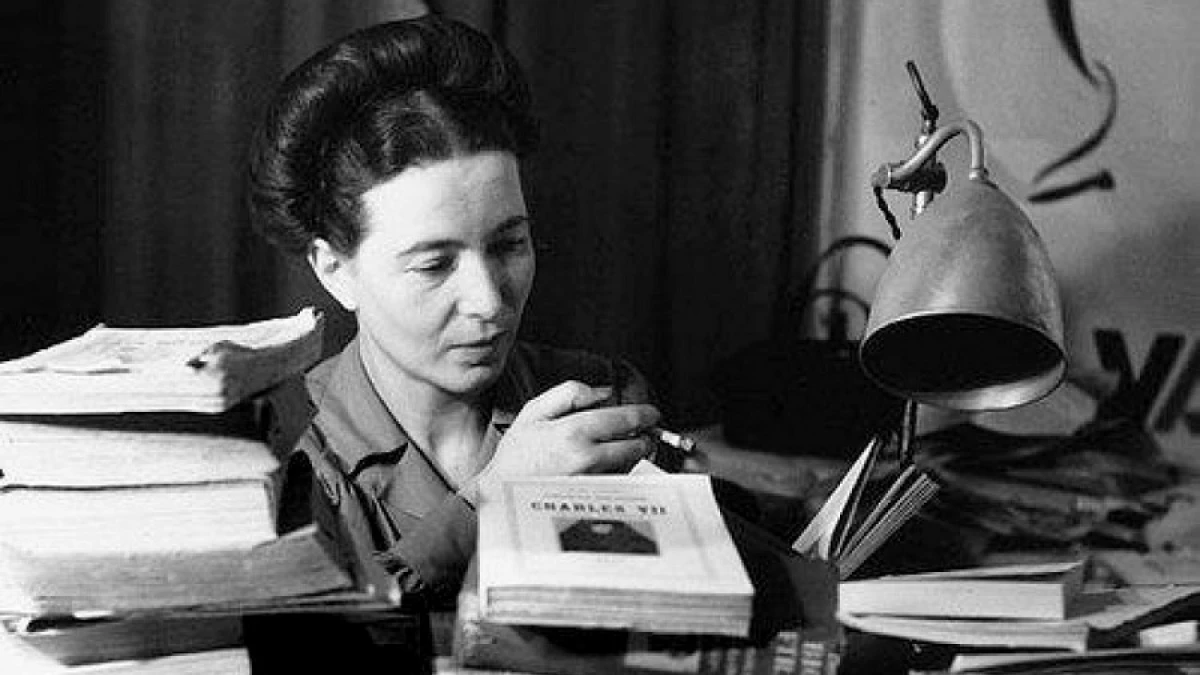(Paris, 1908-1986) French thinker and novelist, representative of the atheist existentialist movement and an important figure in the vindication of women's rights. Originally from a bourgeois family, she stood out from an early age as a brilliant student. She studied at the Sorbonne and in 1929 she met Jean-Paul Sartre, who became her companion for the rest of her life.
He graduated in philosophy and until 1943 he devoted himself to teaching at the lycées of Marseilles, Rouen and Paris. His first work was the novel The Guest (1943), followed by The Blood of Others (1944) and the essay Pyrrhus and Cineas (1944). She participated intensely in the ideological debates of the time, harshly attacked the French right wing and assumed the role of a committed intellectual. In her literary texts she revised the concepts of history and character and incorporated, from an existentialist point of view, the themes of "freedom", "situation" and "commitment".
Together with Sartre, Albert Camus and Maurice Merleau-Ponty, among others, she founded the magazine Tiempos Modernos, whose first issue was published on October 15, 1945 and became a political and cultural reference of French thought in the mid-twentieth century. Subsequently, he published the novel All Men Are Mortal (1946), and the essays For a Morality of Ambiguity (1947) and America a Day (1948).
Her book The Second Sex (1949) was a theoretical starting point for various feminist groups, and became a classic work of contemporary thought. In it she elaborated a history of the social condition of women and analyzed the different characteristics of male oppression. She asserted that by being excluded from the processes of production and confined to the home and reproductive functions, women lost all social ties and with them the possibility of being free. She analyzed the gender situation from the point of view of biology, psychoanalysis and Marxism; she destroyed feminine myths, and urged the search for authentic liberation. She argued that the struggle for the emancipation of women was distinct from and parallel to the class struggle, and that the main problem to be faced by the "weaker sex" was not ideological but economic.
Simone de Beauvoir founded with some feminists the League of Women's Rights, which set out to react firmly to any sexist discrimination, and prepared a special issue of Modern Times devoted to the discussion of the subject. She won the Prix Goncourt with The Mandarins (1954), in which she dealt with the difficulties of post-war intellectuals in assuming their social responsibility. In 1966 she participated in the Russell Tribunal, in May 1968 she showed solidarity with the students led by Daniel Cohn-Bendit, in 1972 she presided over the Choisir association, in charge of defending free contraception, and until her last days she was a tireless fighter for human rights.
Her abundant testimonial and autobiographical titles include Memoirs of a Formal Young Woman (1958), The Fullness of Life (1960), The Force of Things (1963), A Very Sweet Death (1964), Old Age (1968), The End of Accounts (1972) and The Farewell Ceremony (1981).
Megathreads and spaces to hang out:
- ❤️ Come listen to music and Watch movies with your fellow Hexbears nerd, in Cy.tube
- 💖 Come talk in the New Weekly Queer thread
- 💛 Read and talk about a current topics in the News Megathread
 Come talk in the New Weekly PoC thread
Come talk in the New Weekly PoC thread- ⭐️ September Movie Nominations ⭐️
reminders:
- 💚 You nerds can join specific comms to see posts about all sorts of topics
- 💙 Hexbear’s algorithm prioritizes comments over upbears
- 💜 Sorting by new you nerd
- 🌈 If you ever want to make your own megathread, you can reserve a spot here nerd
- 🐶 Join the unofficial Hexbear-adjacent Mastodon instance toots.matapacos.dog
Links To Resources (Aid and Theory):
Aid:
Theory:

Radio-86RK Build, 1/9: KR580VI53 (Intel 8253) and KR580VT57 (Intel 8257) made it home from Slovenia. All that stands between me and a theoretically functional machine is a 74198 (8-bit Shift Register), which none of my usual sources - even Unicorn Electronics or Anchor Electronics - seem to keep in stock. I’ve hit up eBay for that one, though I usually avoid mystery meat chips.
I got my keyswitches in with the latest Mouser order, so I've gone ahead and installed a few to get a feel for how things go. These are pretty nice, although I kind of wish there was a option for a model with a detached keyboard a'la the original Radio Magazine reference design...with a more standard connector, anyways. If I ever decide I want to get the board in a proper case, having it all in one piece like this limits my options somewhat.
Once the system's built up, I plan on building up the ROM cart Sergei made to go along with his implementation of the Radio-86RK design. Provides access to a BASIC interpreter, some classic games, and an actual operating system to go along with the machine's built in monitor program. I'm covering a coworker for the next two weeks so I won't have a whole lot of spare time to work on this one for a bit, but I'll be chipping away at things where I can.
doing the lord's hobby, godspeed comrade
If you want to tackle a build, here's the documentation for Sergei's implementation, including gerbers that can be sent to the PCB fab of your choice! He sells boards himself, but availability is intermittent. The build's of moderate difficulty - perhaps not a good first kit to tackle, but it doesn't do anything too unusual either.
Nice thing about Soviet ICs is that in this case, they're all clones of western designs - the Radio-86RK is a very bread-and-butter 8-bit home computer. 8080 CPU with the usual smattering of support chips, plus a couple of (mostly) ordinary 74LS logic gates. You don't need to do what I did and actually source the major ICs from soviet countries; their easier-to-get Intel counterparts will do just fine.
Notably, I discovered something interesting while doing my reading on this kitbuild - at least one Russian-speaking hobbyist has straight up etched their own clone of the original board at home.